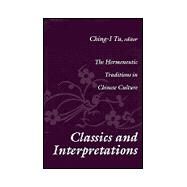Classics and Interpretations: The Hermeneutic Traditions in Chinese Culture
, by Tu,Ching-I- ISBN: 9781560004318 | 1560004312
- Cover: Hardcover
- Copyright: 4/30/2000
In recent years in the "West", scholars have attempted to unravel old constructs of interpretation and understanding, using the discipline of hermeneutics, or the scientific study of textual interpretation. Borrowed from students of the ever growing body of biblical interpretive literature that originated in the early Christian era, theoretical hermeneutics has given many contemporary scholars potent tools of textual interpretation. Classics and Interpretations applies this method to Chinese culture. Several essays focus on hermeneutic traditions of Neo-Confucianism. Others move outside of these traditions to attempt an understanding of the role of hermeneutics in Taoist and Buddhist textual interpretation, in Chinese poetics and painting, and in contemporary Chinese culture.This volume makes a concerted effort to remedy our ignorance of the Chinese hermeneutical tradition. Part 1, "The Great Learning and Hermeneutics", demonstrates the use of commentary to define how the individual createshis social self, and discusses differing interpretations of the Ta-hsueh text and its treatment as either canonical or heterodox. Part 2, "Canonicity and Orthodoxy", considers the philosophical touchstones employed by Neo-Confucian canonical exegetes and polemicists, and discusses the Han canonization of the scriptural Five Classics, while illuminating a double standard that existed in the hermeneutical regime of late imperial China. Part 3, "Hermeneutics as Politics", discusses the transformation of both the classics and scholars, and explores the dominant hermeneutic tradition in Chinese historiography, the scriptural tradition and reinterpretation of the Ch'un-ch'iu, and reveals the pragmatismof Chinese hermeneutics through comparison of the Sung debates over the Mencius. The con






